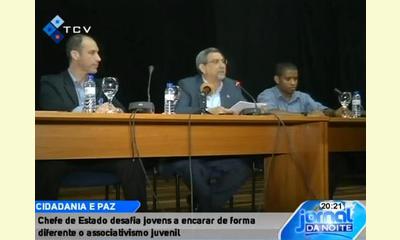|
|
Intercultural Forum on Democratic Citizenship and Culture of Peace Focused on Youth as Promoters of Intercultural Understanding (Cape Verde)
un articulo por Antonio Palazuelos
The Intercultural Forum on Democratic Citizenship
and Culture of Peace organized by Federation of
Youth of Cape Verde (FCJ), with the sponsorship of
UNESCO, will have its official opening on Monday,
May 6 at 10am at the Cultural Center of Mindelo,
chaired by President of the Republic of Cape
Verde, Dr. Jorge Carlos Fonseca.

Opening of the Forum by the President of the Republic of Cape Verde, Dr. Jorge Carlos Fonseca
click on photo to enlarge
In partnership with the United Network of Youth
Peacebuilding and with the support of the United
Nations and the Directorate General of Youth, the
Forum will bring together around 100 participants
to debate democratic citizenship and culture of
peace, as key elements for the sustainable
development of society.
The Forum focuses on strengthening the intercultural
understanding of Creole, African and Global Youth
through promoting initiatives for democratic
citizenship and culture of peace in order to achieve
a more tolerant and global intercultural society.
During the activities, participants will discuss
and interact with experts, share experiences on
the topics presented, hear testimonies of young
promoters of intercultural understanding and
culture of peace, and draw up a declaration and
plan of action on democratic citizenship and
culture of peace, as well as establish a Global
Youth Alliance for Democratic Citizenship and
Culture of Peace.
The Forum, hosted on the island of St. Vicente, is
part of the fifth edition of the African
University of Youth and Development, with the
participation of leaders of major global youth
movements from 40 countries in order to promote
the participation of youth in policy-making for
cooperation for global development, democratic
citizenship, and culture of peace
The University aims to create a space where youth
can affirm and be recognized for their role within
the Euro-African Cooperation, in particular the
implementation of the European African Union
Partnership; facilitate the process of defining
and implementing youth projects within the Global
cooperation, Euro-African and Pan African as well
as the promotion of public policies for youth, and
provide a space for training, non-formal education
and intercultural dialogue for youth leaders.
This fifth edition of the University also includes
the Conference Schedule Post 2015 on Population
and Employment Youth (8-10 May), the 9th Training
Course for Africa-Europe Youth Organizations (3-10
May), the 5th School of Young Leaders CPLP (3-10
May), the formation of Associations, Leadership
and Youth Entrepreneurship (6-10 May), the Meeting
of Youth Organizations Platforms (11-12 May), and
the field of International Volunteer Heritage (11-
20).
(Click here for a Portuguese version of this article)
|








|
DISCUSSION
Pregunta(s) relacionada(s) al artículo :
Is there a renewed movement of solidarity by the new generation?,
* * * * *
Comentario más reciente:
from Javier Collado Ruano, Director of Edition at Global Education Magazine, on the occasion of the International Day of Solidarity.
Solidarity is a trans-dimensional phenomenon that goes beyond the ontological essence of human nature. In fact, when we analyze the connections between the microcosm and the macrocosm, we perceive that human beings are not involved in chaos and arbitrariness, but belongs to the large network of interdependencies, complementarities and reciprocities that constitute life. The emergence of life on Earth, around 3,8 billion years ago, was a complex process of exceptional natural phenomena, inherent in all living systems. A process which is expressed through unlimited creativity: mutation, gene exchange, and symbiosis. From a cosmo-biological perspective, we can understand a new conceptual dimension of life, where all living beings share same basis of genetic code: the twenty amino-acids and four phosphatic bases. In fact, the diversity of living beings is caused by the combination of this cosmo-bio-genetic basis.
This trans-dimensional perspective has a deep ecological and spiritual sense for our worldview because the human evolutionary adventure is the latest stage of life on Earth. The modern human being is a vertebrate animal, mammal, belonging to the primates, which emerged 200,000 years ago. In recent centuries he has imposed its anthropocentric, industrial and capitalist vision to the detriment of Pachamama (and Indigenous goddess known as earth mother). We consume around 120% of the natural resources that Earth Mother regenerats annually. Our consumer behavior is immersed in a fatalistic dynamic with a destiny to climate change (deforestation, loss of biodiversity, ozone, etc.), and our own self-destruction as a species.
There is an urgent need to get beyond the cognitive fallacy that the mental structures of social Darwinism and capitalist postulates of the 19th century have historically constituted, because they only understand natural and social systems as warmongers and competitive processes whereby species diverge from each other. . ... continuación.

|
|









